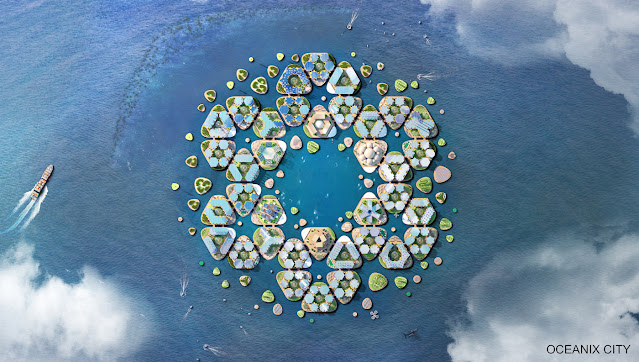World's First Floating City
 |
| Floating City: Credid OCEANIX |
By 2025, the world's first floating city, which will be constructed off the coast of South Korea, is expected to be finished. What makes it more interesting is the fact that the city, simply a cluster of hexagonal platforms resting on top of the water, is claimed to be capable of surviving natural disasters such as floods, tsunamis, and Category 5 hurricanes.
The floating settlement, which will be created off the coast of Busan at an estimated cost of $200 million and backed by the United Nations, will be a "flood-proof infrastructure" made up of multiple man-made islands.
The floating city will be self-sufficient in terms of food, energy, and water, thanks to a collaboration between the project's designer, OCEANIX, and the UN Human Settlement Programme (UN-Habitat).
It will generate electricity using solar panels on the roofs of buildings and transport residents in futuristic boat pods. Organic farming in aeroponic and aquaponic systems, as well as regular outdoor farms and greenhouses, will be encouraged, claimed reports.
While the exact size of the city has yet to be defined, it is expected to have a population of 10,000 people, divided into 300-person large neighbourhoods. To conserve space, energy, and water, residents will have to eat a mainly plant-based diet, according to OCEANIX. It was also reported that to identify who the inhabitants will be and how they will be selected, work is still ongoing.
Locally sourced materials, such as fast-growing bamboo, will be used to build the metropolis. Limestone coating will be used to construct the platforms. Scallops, kelp and other types of seafood might be housed in cages beneath the platforms, it was reported that waste from fish could be used to nourish plants in aquaponic systems.
Itai Madamombe, the co-founder of OCEANIX, told Business Insider that since Busan, a city of 3.4 million people, is threatened by rising sea levels, they understood that it will be the best place to deploy this prototype. She said: “This is something that we hope will be useful to all coastal cities around the world, and all coastal communities who are facing the challenge of sea-level rise."
As per Daily Mail, Maimunah Mohd Sharif, who is the executive director of UN-Habitat, explained that sustainable floating cities are one of the climate adaption solutions they have at their disposal. Sharif said: “We look forward to developing climate adaptation and nature-based solutions through the floating city concept, and Busan is the ideal choice to deploy the prototype.”
Madamombe stated that her team will work with South Korean designers to modify the prototype to the local surroundings. She also said that OCEANIX will present the results of those efforts at a second UN roundtable [next year in April]. The crew will next begin engineering the platforms and obtaining construction approval.
According to Madamombe, UN-Habitat will collect data on how the Busan development is faring, while OCEANIX is currently in talks with at least 10 additional countries about constructing other floating cities.
As the world's temperature rises, hurricanes and floods are becoming more common and severe. According to a recent analysis by Climate Central, a non-profit research organisation, in the worst-case scenario — 4 degrees of warming — at least 50 large cities will lose most of their populous areas due to rising sea levels over the next 200 to 2,000 years.
According to another report, tropical countries will experience more coastal inundation as a result of rising sea levels than other countries. Scientists discovered coastal locations that are vulnerable to a one-meter rise in sea level, which is expected to reach by 2100. The study discovered that 62 per cent of these low-lying places were in the tropics, with Asia accounting for one-third of the total.



Comments
Post a Comment